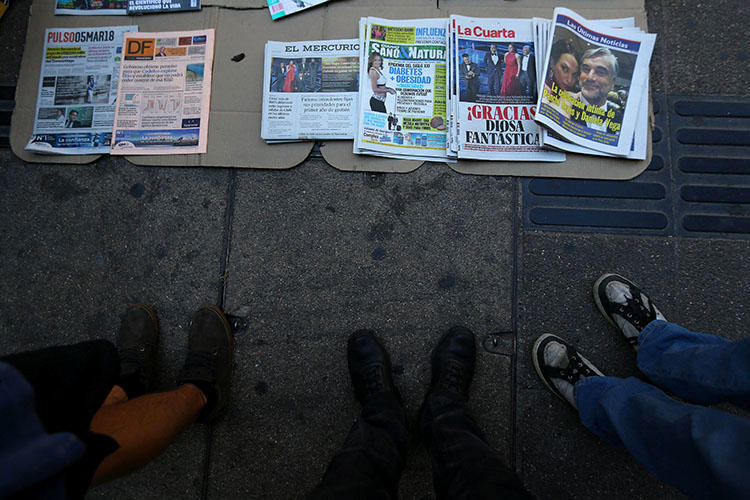New York, July 27, 2018–Chilean authorities should immediately drop all criminal proceedings against a journalist charged with defamation, and lawmakers should act swiftly to repeal all criminal defamation laws, the Committee to Protect Journalists said today. The journalist, Javier Ignacio Rebolledo Escobar, could face up to three years in prison if convicted next month.
Rebolledo, an investigative magazine journalist and author of two books, is charged with defamation for “damaging the honor” of a former military officer convicted of human rights abuses in his most recent book, “Camaleón,” published in August 2017, according to Rebolledo and news reports. In May, a judge dismissed the initial complaint against Rebolledo, but an appeals court in June overturned the decision and last week set a court date for August 16, Rebolledo told CPJ by phone.
“We urge Chilean authorities to immediately drop all criminal defamation charges against Javier Rebolledo,” said CPJ Central and South America Program Coordinator Natalie Southwick. “It’s absurd that Chile’s defamation laws allow for a journalist to be imprisoned for describing crimes that have led to a conviction.”
According to reports, Carolina Paz Quintana Poblete sued Rebolledo on April 30 for damaging the reputation of her father, Raúl Quintana Salazar, a former lieutenant colonel who is serving a 20-year prison sentence for crimes against humanity committed during the 1973-1990 dictatorship of Augusto Pinochet. On May 8, a judge in a criminal court in the capital, Santiago, ruled in Rebolledo’s favor. However, a Santiago appeals court overturned the decision on June 13, determining that “the content that drives the grievance can be considered under criminal charges,” Rebolledo read from the ruling on the phone with CPJ. On July 18, Rebolledo was notified that his court date was set for August 16.
Rebolledo has centered his work around uncovering crimes committed by the National Intelligence Directorate (DINA) torture and extermination centers (Tejas Verdes). In “Camaleón,” he gives a detailed account by Mariano Jara, a former member of the military junta, about crimes committed under Pinochet’s rule, including one incident in which Salazar allegedly sexually assaulted and tortured a Uruguayan female prisoner, according to Rebolledo.
In response to this reporting, Quintana Poblete filed a criminal defamation suit against the journalist, citing Article 416 of Chile’s criminal code and claiming that recounting the events involving her father brought dishonor to the former officer and his family, according to news reports.
El Colegio de Periodistas in Chile and regional press freedom group Instituto Prensa y Sociedad (IPYS) have released statements condemning the case.
Criminal sentences for defamation suits can range from 61 days to 3 years, but recently courts in Chile have tightened their parameters for defamation suit decisions and other suits involving freedom of expression, according to Rebolledo’s lawyer, Paulo Olivares, who spoke to CPJ over the phone.
“Anyone has the right to file a lawsuit, but the judicial system must take these cases carefully, and follow strict parameters,” Olivares told CPJ. “The most important thing is that the criminal justice system in Chile doesn’t transform into a tool for censorship.”
CPJ has previously documented the use of outdated criminal defamation laws to restrict critical reporting in Latin America. In February 2016, CPJ released a comparative study of defamation laws in the Americas at a conference in Peru. Although criminal defamation cases have been less common in Chile, the country’s criminal code still contains provisions that allow for jail sentences of up to three years for defamation.
